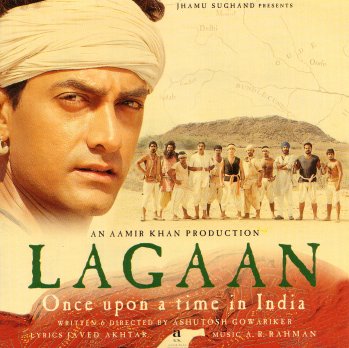Country: India
It's only fitting that I follow up Slumdog Millionaire with a genuine Bollywood flick. This particular one was made fairly recently and gained much acclaim, most notably an Oscar nomination for Best Foreign Film and worldwide popularity. I chose to seek it out in the middle of a gloomy Canadian winter with hopes of raising my snow-bound spirits, and boy, did it do the trick. True to the ambitions of many a Bollywood picture, Lagaan is hugely entertaining on multiple levels.
The film is set in 1893, when the British still had a colonial presence in India. Its title refers to a grain tax that villages must pay towards the English. In the midst of a draught, a small village's prospects grow considerably darker after the arrogant Captain Andrew Russell (a villain perfectly designed to draw all manners of boos and hisses from the audience) doubles the Lagaan for seemingly no other reason than sheer malice towards the native population. Enter Bhuvan, a spirited young man (played by star Aamir Khan, who also produced the film) who takes up a challenge against the sneering officer for his people's good: a cricket match which, if won by the village, will excuse the entire province from Lagaan for three years; but if the British win, the Lagaan will be tripled.

I was delighted to notice that this film bears many similarities with another Asian epic: Seven Samurai. As in that film, a village facing a threat from forces of oppression must gather together a team of heroes in a short period of time to prepare, practice and mount a defensive force. Granted, Lagaan is set in India, centers around a cricket match rather than actual combat and throws in all sorts of extra ingredients like colonial politics and enthralling musical numbers, but nonetheless, the resemblances are there. As in Kurosawa's film, the story's structure allows plenty of time to be devoted to the numerous characters both within and outside the village as each side prepares themselves and the cricket match looms closer and closer. Plenty of subplots crop up, most prominent among them a love triangle between Bhuvan, Gauri (Gracy Singh), a village girl who harbors strong feelings for him, and Elizabeth (Rachel Shelley), the Captain's sister who decides to help the Indian team.
Lagaan could accurately be described as more focused and straight-forward than most other Bollywood epics. By sticking to the villagers' plight and their opposition to the colonial forces' tyranny, it maintains a fairly consistent tone and doesn't go overboard with too many outlandish elements. That said, it still contains its share of song and dance sequences, which I greatly enjoyed. The music was provided by none other than A.R. Rahman, who also composed the score for Slumdog Millionaire and is nominated for three Oscars for his work on that film (for Best Original Score and the songs "Jai Ho" and "O Saya"). Each song provided a nice break from the narrative flow while amplifying the characters' emotions at various points with hugely entertaining vivacity (though maybe it wasn't such a good idea to have Elizabeth join in for one song with her own, comparatively bland Western musical style).

Even though it clocks in at 3 hours and 45 minutes, Lagaan moves its story along at a steady pace, and not one minute of it felt wasted. This is probably as good a "crossover" flick into the vast realm of Bollywood cinema as you're likely to find, giving a good taste of authentic Indian screen entertainment in a highly accessible form. It certainly worked for me, and I'm looking forward to seeking out more of the delights that Bollywood has to offer. For those of you out there who are looking for something to tide you over until Slumdog comes out on DVD (or, at least, sweeps the Oscars, which I'm hoping it does), why not give this a try?









1 comment:
Its nice to see someone writing about an Indian movie from outside India.
It is indeed a good movie but dont you think too predective, the moment Bhuvan accepted the Captain's bet we all knew what is going to happen, also the movie depicts the Cricket incidents which at first came to scene in 20th century but they shown them in 1893.
Anyhow almost all the movies here are musicals(a movie in 50s named Indrasabha had 72 songs), so its too obvious here, which is not the case in Hollywood.
We like to say it Hindi Film Industry rather than Bollywood so hope outsiders too call these as Hindi movies instead of Bollywood stuff and all...
Thanks
Post a Comment